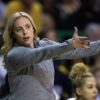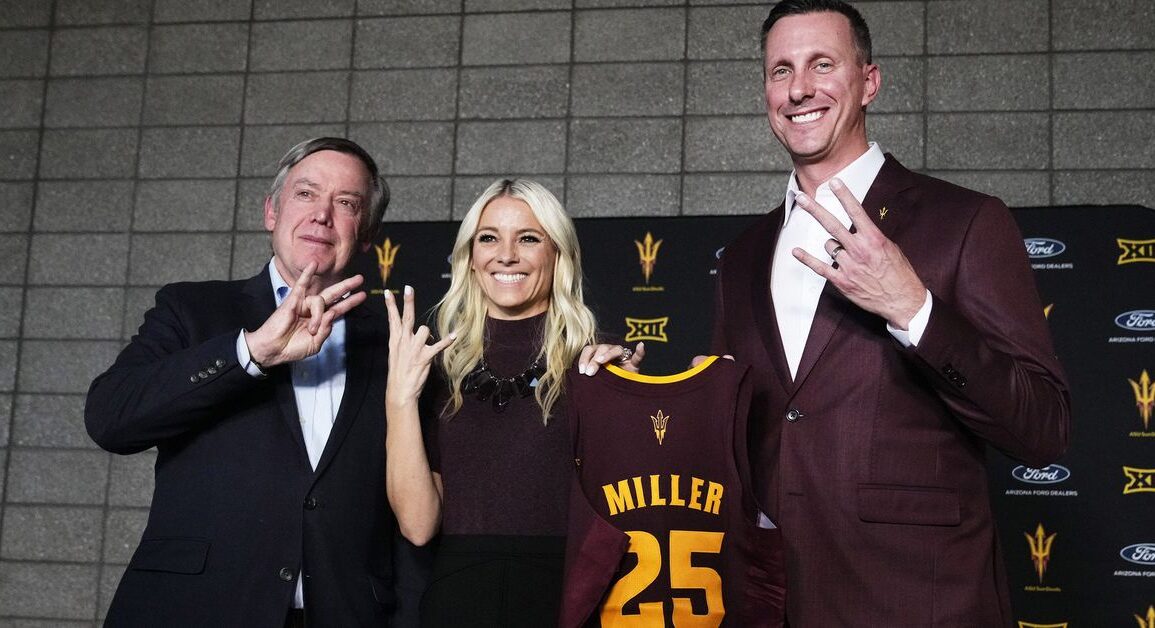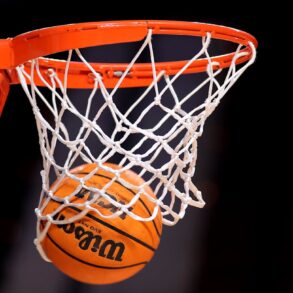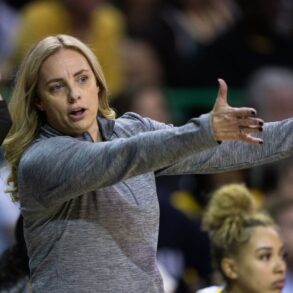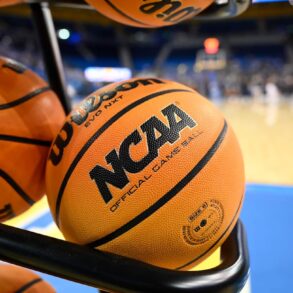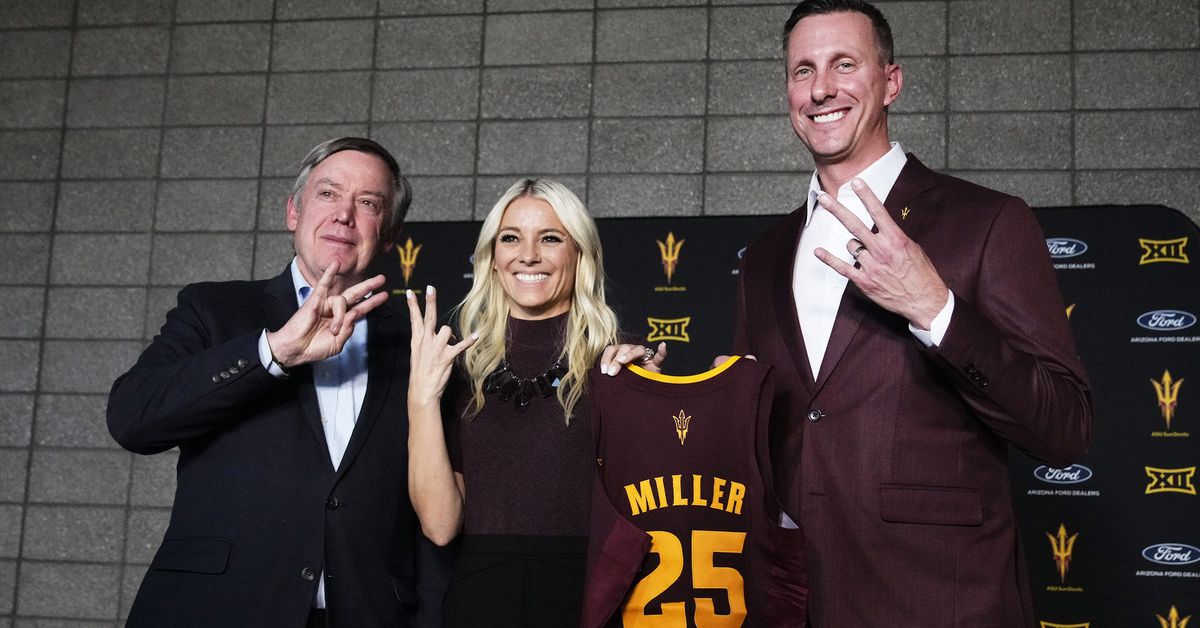
More than 60 Division I programs in women’s college basketball made a change at head coach so far in 2025. Some schools had to find new leaders of their programs after firing a coach, while others had to replace ones that retired or left for a different job.
At the Power 4 level, there were 10 changes, including at both of the Big 12 programs in Arizona, three in the SEC and two in the ACC. The mid-major ranks saw waves of changes too, with one job even opening this week at Army following the resignation of Missy Traversi.
Below is a completely unscientific ranking of the 11 most interesting hires made so far this year based on a variety of factors including the candidate profile, fit, resources and investment from the athletic department. These aren’t the best hires or the worst ones, just a select few that are worth paying attention to.
Matthew Mitchell, Houston
When this coaching carousel started spinning back in late February, Mitchell was letting folks know that he wanted to get back on the sidelines. After sniffing around at a few SEC openings, he landed at Houston where he succeeded Ronald Hughey and inherited a rebuilding project. The Cougars have been to one NCAA Tournament in the last 20 years and have had two rough seasons in the Big 12 where they’ve gone a combined 6-30 in conference play.
While he’s taken five seasons off, Mitchell brings real credibility to Houston as someone who has been a big winner. In 13 seasons at Kentucky before his health-related retirement in 2020, he took the Wildcats to nine NCAA Tournaments, won the regular season SEC title twice, produced WNBA Draft picks and won 69.5 percent of all his games. Hiring Mitchell appears to be a sign that Houston is finally ready to get serious about women’s basketball.
Jamie Carey, Omaha
Omaha opened quite late in the coaching carousel season as the school fired former coach Carrie Banks on April 22. Still, even that late into the cycle, they landed a seemingly strong candidate in Carey, who has been a college assistant coach for a decade and has been one of Karen Aston’s top assistants for several years. Carey played in the WNBA and was a standout player at Stanford and Texas, earning the Pac-12 Freshman of the Year award and two All-Big 12 selections. She’s a native of Kansas and coached high school basketball for a few years in Colorado, making her familiar with the footprint of the Summit League. Since making the jump to Division I in 2011, Omaha has never had a winning record in conference play and has yet to make an NCAA Tournament.
Ayla Guzzardo, McNeese State
It’s a little bit surprising that Guzzardo didn’t land a bigger job in this cycle after working near-miracles at SE Louisiana State. After the Lions had losing records in 22 of their last 24 seasons, Guzzardo guided them to five straight winning campaigns, captured a pair of Southland Conference titles and went to the NCAA Tournament in 2023. She jumped to a school in the same conference that has more resources and cares about women’s basketball, but hasn’t had a winning season in the sport in a decade.
Guzzardo is a promising young coach, and if she can turn McNeese into a winner quickly — perhaps in the same way former men’s coach Will Wade did — she might be able to parlay that success into a Power 4 gig within a few seasons.
Karen Blair, Georgia Tech
Nell Fortner’s retirement from Georgia Tech was surprising considering that she had just signed an extension back in February, but it was apparent that the former Yellow Jackets coach was a bit exhausted by the current state of college sports where NIL and the transfer portal carry so much weight. The Yellow Jackets made an impressive hire by giving Karen Blair her first crack at being in charge of her own program after serving as the top lieutenant to Brenda Frese for several years at Maryland.
In College Park, Blair helped Frese land stellar high school recruits and comb the portal for other pieces that fit, which translated into rosters that won a lot of games for the Terps — including three Big Ten titles. She’ll try to do the same at Georgia Tech, but the school in Atlanta has been notoriously difficult to recruit star players to, and even more so to retain them in this new era. This offseason, seven Yellow Jackets entered the portal and six of them landed at fellow Power 4 programs. The job ahead of Blair won’t be easy.
Raina Harmon, Florida Gulf Coast
Karl Smesko built FGCU from scratch beginning in 2002 and over the next 23 years saw the Eagles transition from Division II to Division I and then become a mid-major power, making 11 NCAA Tournaments in the past 14 years and pulling off first-round upsets in four of those. Smesko left FGCU in November to become the head coach of the WNBA’s Atlanta Dream and his top assistant Chelsea Lyles joined him there this spring after one season on the job where she won 30 games.
The question now is, can FGCU remain a power in women’s basketball in the post-Smesko era? Caitlin Clark thinks they can after the Eagles hired Harmon, who spent eight seasons as an assistant coach at Iowa under Lisa Bluder and Jan Jensen, where the Hawkeyes enjoyed some of their most successful seasons in program history. Harmon will be tasked with keeping the Eagles contending for March Madness berths while putting her own stamp on the program.
Becky Burke, Arizona
The 35-year-old former Louisville guard has won everywhere she’s been, but has never stayed anywhere long. She won 21 games at NAIA Embry-Riddle and turned that into a job at Division II Charleston where she went 48-14 in two seasons. She then jumped to Division I where she turned USC Upstate from an eight-win team into a 22-win team. This past season at Buffalo, the Bulls won a program-record 30 games and captured the WNIT title.
Burke will now test herself at the Power 4 level in the Big 12 at a rebuilding Arizona program following the departure of Adia Barnes. The Wildcats have had 11 players enter the portal this offseason, so Burke will have to reload the roster.
Winston Gandy, Grand Canyon
Gandy has worked under some of the best coaches in the sport, from Brenda Frese and Tina Langley to Kara Lawson and Dawn Staley, in addition to a stint under Scott Brooks with the Washington Wizards. Now Gandy, in his early 30s, will get to run his own program at Grand Canyon. That the Lopes hired Gandy — who is coming off a second consecutive trip to the national title game with South Carolina — says that they want to maintain their status as a winning program and one of the best in the mid-major ranks following the departure of Molly Miller.
After hiring Gandy, Grand Canyon president Brian Mueller said of Miller: “She’s interviewed for jobs after every single year. We wanted someone who wanted to be here.” But it will be a sign of massive success for Grand Canyon — and an indicator that they can remain a strong program even with turnover at the head coach spot — if Gandy leaves for a Power 4 gig within a few seasons, because he will only be able to do so if he has won.
Kellie Harper, Missouri
After a year away from the sidelines, spending that time as a TV commentator for the SEC Network, Kellie Harper is back coaching. She succeeds Robin Pingeton at Missouri, who briefly retired before then filling the opening at Wisconsin. While it’s true that Harper did not meet expectations in her previous two stints as a Power 4 head coach at Tennessee and N.C. State, it’s worth noting that the expectations at Mizzou are very different from those storied programs. As a head coach, Harper has a 393-260 win-loss record, giving her a winning percentage of 60.2. She’s been to the NCAA Tournament nine times in 20 seasons and has gone to the Sweet 16 three times – including an unlikely and impressive trip to the second weekend with Missouri State in 2019.
At Missouri, she won’t be coaching in the shadows of Pat Summitt or Kay Yow. The bar for the Tigers — who haven’t had a winning record in the SEC or been to an NCAA Tournament since 2019 — is much lower. If Harper can do at Missouri what she did at Tennessee, Tigers fans would be incredibly happy. Harper’s resume, which includes the bullet point that she’s one of two coaches in the history of the sport to coach four different teams in the Division I NCAA Tournament, says she can be successful at Missouri. She knows the state, knows the SEC and knows how to win.
Adia Barnes, SMU
This was arguably the splashiest hire of the offseason because it was the only case of one Power 4 program poaching a sitting head coach from another. Barnes’ relationship with her alma mater, Arizona, had soured a few seasons after taking the Wildcats to the national title game and her eyes had started to wander after not receiving an extension heading into the final year of her contract. Enter Damon Evans, who in one of his first moves as SMU’s new athletic director fired former coach Toyelle Wilson and days later paid Barnes’ buyout and hired her away from Arizona. It’s a sign that the Mustangs — almost a full year into their ACC membership — are ready to invest in women’s basketball.
Barnes has already transformed the roster, with 10 players leaving the program and 11 players — including a few from Arizona — transferring in. SMU spent big in football and volleyball and saw those programs turn into winning ones in the ACC. Whether Barnes can harness the Mustangs’ resources and apply them to women’s basketball will be worth watching.
Larry Vickers, Auburn
The Auburn coaching search was a weird one with lots of twists and turns. After initially signaling that the school wanted to spend big money and make a head-turning hire, the search soon pivoted to cheaper options and the Tigers began targeting some up-and-coming mid-major coaches. The job ultimately went to Larry Vickers, who had gone 83-13 over the last three seasons with Norfolk State, guiding the Spartans to three straight NCAA Tournament appearances.
The leap from the MEAC to the SEC is a big one and an opportunity that coaches from HBCU programs aren’t often afforded. A lot of eyes will be on Vickers — not solely because of what his future win-loss record might be, but also what resources Auburn gives him to be competitive in the SEC. If Vickers succeeds at Auburn, it could embolden more major conference programs to take chances on good HBCU coaches.
Molly Miller, Arizona State
Miller was the top candidate for several openings this season and had her choice of several Power 4 openings. She was pursued hard by Arkansas, but ultimately decided to stay in the greater Phoenix area, jumping from Grand Canyon to Arizona State. Under the direction of Miller, the Lopes went 32-3 this season, capturing the regular season and tournament titles in the WAC, making the NCAA Tournament for the first time ever, and beating Arizona State, Arizona and Northern Arizona along the way.
The 38-year-old was 117-38 in five seasons at Grand Canyon and she had a ton of success in the Division II ranks too, leading Drury College to a 118-17 record and five NCAA Tournament berths in six seasons. Her profile and career path has drawn comparisons to Kim Caldwell, who had success in the Division II and mid-major ranks before making the jump to Tennessee where she led the Lady Vols to the Sweet 16 this season. Miller has already brought in six transfers to help her turn Arizona State around quickly.
This post was originally published on this site be sure to check out more of their content.



